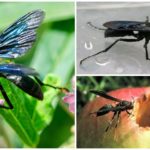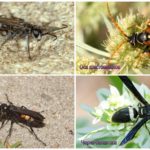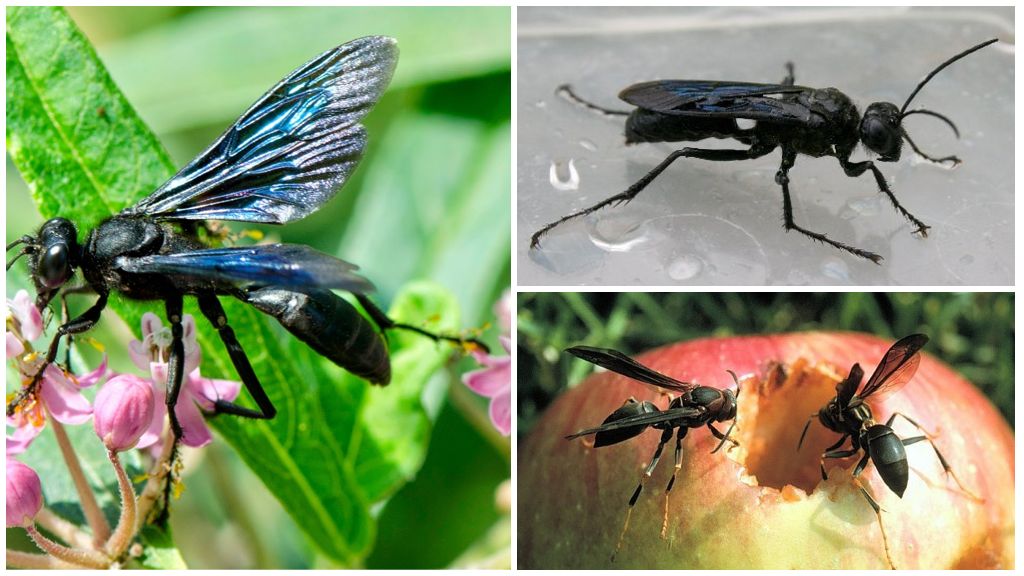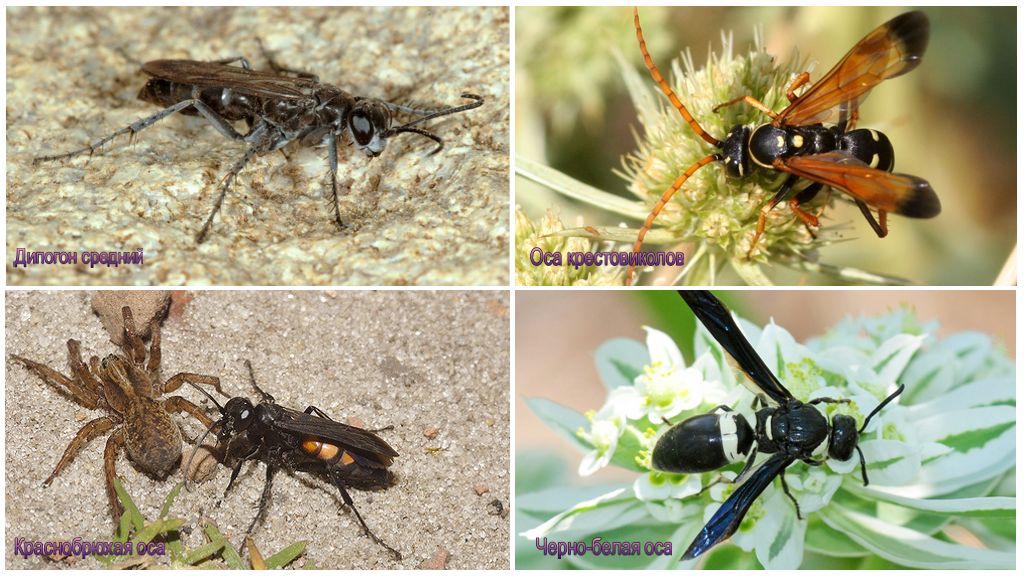Description and photo of black wasps
- Black wasp
- Varieties of Pompilis
The black wasp is a representative single, road or sand wasp. Belongs to the squad Includes a family of pompiles, Scolium, scurvy, German women. In the world there are about 5 thousand types of road wasps. The colors are predominantly black with white, red, red spots, stripes. There are everywhere, including in Russia.
Appearance Description
The black wasp of medium or large size is 15-50 mm. Dark head, chest, belly with stripes, spots of yellow, white, red, purple. The wings are soft, smoky, folded parallel to the body.
The legs are long, thin, on the front there are digging ridges. Hind tibia with spines, tubercles. On a small head, eyes, small antennae are clearly visible. Pompilids have a powerful sting with which they quietly pierce the shell of large insects of their larvae. A photo of a black wasp is presented below. Coloring is different depending on the species.
Habitats
The black wasp in Russia is found in the forest, in the fields, along the roads, in the household plots, in the gardens, in the vegetable garden. The main criterion for choosing habitats is soil. It should be loose enough for digging, not loose, so that mink does not collapse. Most often it is a mixture of sand, clay, limestone.
On a note!
The black wasp often settles near the man’s house, but it is quite difficult to spot an insect in a single specimen. In the garden, garden, insect benefits, destroying spiders, flies, pollinating plants.
Lifestyle
The black wasp refers to solitary representatives. Uterus don't create big nestshow to do it paper wasps, do not swarm, do not transmit signals to other individuals. In the spring they lead a carefree lifestyle, flying around the area, collecting nectar.Night is spent on plants, in the grass, old hollows of trees.
By summer, the females of the black wasps begin to worry about the extension of the genus. Minks are dug in the ground, about 3 cm deep. At the end of the tunnel they form a single cell in which the larva will develop. Closes the entrance to the hole with a stone or a breast of the earth, goes on a hunt.
Spiders are often a potential victim. The female paralyzes them with a powerful poison, drags them into the prepared hole. She lays an egg into the body, closes the entrance. After a few hours, the larva appears, which will eat alive for a spider for 14 days. At the end of the development cycle forms a cocoon. After several days, imago crawls out of the ground. The larvae, which develop at the end of summer, remain to winter in the state of the pupa.
For each larva, the black wasp forms a separate mink. Sometimes it uses already completed moves made by other insects, as well as old hollows of trees.
On a note!
Single earthen wasps are called universal, strong predators. Often, their victims are poisonous spiders, bugs.
Varieties of Pompilis
Road or earthen wasps live around the globe, differ in size, color, but lead an identical lifestyle.
- Dipogon average. The Latin name is Dipogon hircanum. Completely black. Body size about 1 cm. Wings with small dark spots. They hunt spiders-bokohodov. They live on trees, burrows are built inside branches, shoots, hollows. They are representatives of the fauna of Japan, Eurasia, Kamchatka.
- Wasp crosser. In Latin Batozonellus lacerticida. A large black wasp with yellow stripes on its belly, orange wings. Limbs black and red color. Body size up to 21 mm. The victims are the spider crosses. Nests form in the soil. They live in the territory of Eurasia, Japan, and North America.
- Red-bellied wasp (Anoplius viaticus). Insect reaches the size of 15 mm. Body black, belly red. Hunts a wolf spider. Builds nests in the ground. The species is common in Eurasia.
- Black and white wasp. In Latin, it is called Monobia quadridens. The body is black with white stripes, stained. The size of females is about 18 mm. A white wasp builds nests in various cavities left by hives of tree bees. The larvae of butterflies are the victims.
Insects bring favor agriculture, destroying a huge number of pests. However, the accidental collision of a person with a predator can end a bite.
Danger
The bite of a black wasp is compared to a red ant.Causes severe pain, redness, swelling, swelling. Bright painful sensations are present for 3 days. Poison can cause strong allergic reactionup to anaphylactic shock. At risk Small children, pregnant women, elderly people.
The black road wasp feeds on the nectar of flowers, the juices of plants, fruits, and extracts protein food for the larvae. Often settled on the territory of man, but does not approach the house. When confronted with people trying to quickly fly away or crawl away. Pompilidae are less aggressive than paper, public wasps, so sting is much less common. Set in motion stingdefending their own lives, bite will not without threat.









